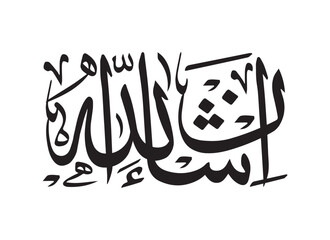Inshallah, a phrase commonly used in the Muslim world, carries profound significance and beauty. Translated to mean “if Allah wills it,” it encapsulates the belief that all outcomes are ultimately in the hands of God. However, the meaning and usage of inshallah go far beyond surface-level translations. Its multifaceted interpretations and expressions provide unique glimpses into the rich cultural and religious tapestry of the Islamic faith.
In this article, we delve into the intricacies of inshallah and explore its various dimensions. From everyday usage as a verbal expression of hope and reliance on divine providence to deeper theological and philosophical implications, the word carries immense weight in the lives of Muslims around the world. We also examine how inshallah has transcended religious boundaries and become a phrase used by individuals of diverse backgrounds.
Join us as we unpack the multifaceted interpretations and expressions of inshallah, shedding light on its importance within the Islamic community and beyond. By gaining a deeper understanding of this phrase, we can foster greater cultural understanding and appreciation for the diverse ways in which people express their faith and hope for the future.
The meaning and origin of “Inshallah”
The phrase “Inshallah” has its roots in the Arabic language, which is the language of the Holy Quran, the sacred book of Islam. In Arabic, “Inshallah” is written as إن شاء الله and is composed of three words: “In” meaning “if,” “sha’a” meaning “to wish or will,” and “Allah” meaning “God.” It is a concise expression that conveys a profound understanding of the relationship between human agency and divine providence.
The usage of “Inshallah” dates back to the time of Prophet Muhammad, who is believed to have used the phrase frequently. It is mentioned in the Quran and has since become deeply ingrained in the vocabulary of Muslims worldwide. The phrase carries a sense of humility and submission to the will of Allah, acknowledging that all plans and endeavors are subject to His divine decree.

Cultural and religious significance of “Inshallah”
“Inshallah” holds great cultural and religious significance within the Muslim community. It is more than just a phrase; it reflects a way of life grounded in faith and trust in God’s wisdom. Muslims use “Inshallah” as a verbal expression of hope, acknowledging that the final outcome of any situation lies in the hands of Allah. It serves as a reminder to remain humble, patient, and accepting of whatever comes their way.
The significance of “Inshallah” extends beyond individual beliefs and practices. It fosters a sense of community and unity among Muslims, as it is a phrase commonly shared and understood by people of various backgrounds and cultures. In times of joy, sorrow, and uncertainty, “Inshallah” serves as a unifying thread that connects individuals through their shared faith and reliance on divine guidance.
Different interpretations of “Inshallah” across various religions and cultures
While “Inshallah” is predominantly associated with the Islamic faith, its essence of surrendering to a higher power resonates with individuals of different religions and cultures. In Christianity, for example, the phrase “Deo volente” or “God willing” is often used as an equivalent expression. Similarly, in Judaism, the phrase “B’ezrat Hashem” or “With the help of God” conveys a similar sentiment.
The universality of the concept behind “Inshallah” reflects the shared human experience of recognizing the limitations of human control and acknowledging the presence of a higher power. It highlights the common thread that runs through diverse religious and cultural traditions, emphasizing the importance of humility, faith, and trust in the face of uncertainty.
Linguistic variations of “Inshallah” in different languages
As Islam spread across different regions of the world, the Arabic phrase “Inshallah” has been adapted and incorporated into various languages, each with its own linguistic nuances. In Turkish, “Inshallah” is commonly expressed as “Inşallah.” In Persian, it is “Insha’Allah.” These variations reflect the cultural and linguistic diversity of the Muslim world while maintaining the core essence of surrendering to the will of Allah.
The linguistic variations of “Inshallah” not only demonstrate the adaptability of the phrase but also serve as a testament to the enduring influence of Arabic as a language of religious significance. Regardless of the language used, the meaning and intent behind “Inshallah” remain consistent, serving as a reminder of the fundamental belief in divine guidance and providence.
The role of “Inshallah” in daily life and communication
In daily life, “Inshallah” is a prevalent phrase used by Muslims in a variety of contexts. It serves as an expression of hope, a reminder of God’s sovereignty, and a recognition of the uncertainty of the future. Whether it is used to signify a future plan, express a desire for a positive outcome, or acknowledge a sense of resignation, “Inshallah” is deeply ingrained in the fabric of Muslim culture.
In communication, “Inshallah” acts as a cultural marker, conveying more than just a simple “yes” or “no” response. Its usage can indicate a level of commitment, sincerity, and reliance on divine intervention. When someone says, “I will meet you tomorrow, Inshallah,” it implies that the plan is subject to God’s will, and the outcome is uncertain. This nuanced understanding strengthens the bonds of trust and understanding within the Muslim community.
“Inshallah” in literature, poetry, and art
The beauty and significance of “Inshallah” extend beyond everyday conversations and find expression in various forms of artistic and cultural expression. In literature, poetry, and art, “Inshallah” is often invoked to evoke a sense of hope, resilience, and trust in a higher power. It is a recurring motif that reflects the profound faith and spiritual connection of the Muslim community.
In Islamic poetry, for example, “Inshallah” is frequently used to express longing, desire, and anticipation for a future event or outcome. It adds depth and layers of meaning to the verses, emphasizing the interplay between human aspirations and divine intervention. Similarly, in Islamic art, calligraphic representations of “Inshallah” adorn mosques, homes, and public spaces, serving as a visual reminder of the central role that faith plays in the lives of Muslims.
Cultural nuances and etiquettes associated with “Inshallah”
Understanding the cultural nuances and etiquettes associated with “Inshallah” is essential for respectful and meaningful interactions with Muslims. The phrase is often used to express a genuine intention or desire, but it can also be employed as a polite way of declining or postponing a commitment. It is important to recognize that when someone says “Inshallah” in response to an invitation, it may indicate a level of uncertainty rather than a definite affirmation.
Additionally, the tone and context in which “Inshallah” is used can convey different meanings. A confident and enthusiastic “Inshallah” may indicate a strong belief in a positive outcome, while a more cautious or resigned tone may suggest a recognition of the unpredictable nature of life. Being aware of these nuances fosters better cross-cultural understanding and facilitates respectful communication with individuals who use “Inshallah” as part of their daily vocabulary.
Misunderstandings and misconceptions surrounding “Inshallah”
Despite its widespread usage and cultural significance, “Inshallah” has sometimes been subject to misunderstandings and misconceptions. In popular culture and media, it is often portrayed as a phrase used to avoid commitment or responsibility. However, this portrayal oversimplifies the complex layers of meaning and intention behind the phrase. It fails to recognize the deeply rooted religious and cultural significance associated with “Inshallah.”
By exploring the multifaceted interpretations and expressions of “Inshallah,” we can dispel these misconceptions and foster a more nuanced understanding of its true essence. Recognizing the importance of faith, humility, and reliance on divine guidance allows for a more accurate representation of the phrase and the Muslim community as a whole.
Contemporary usage of “Inshallah” in popular culture and media
In recent years, “Inshallah” has found its way into popular culture and media, transcending religious boundaries and becoming a phrase used by individuals of diverse backgrounds. It has been embraced as a symbol of hope, resilience, and acceptance of the unknown. In music, literature, films, and even everyday conversations, “Inshallah” has become a bridge that connects people from different walks of life.
The increased visibility of “Inshallah” in popular culture provides an opportunity for greater cultural understanding and appreciation. It allows individuals to engage with the rich tapestry of the Islamic faith and recognize the shared human experiences that connect us all. By embracing the essence of “Inshallah” and its significance, we can foster dialogue, empathy, and acceptance in an increasingly interconnected world.

